The SSD Relapse: Understanding and Choosing the Best SSD
by Anand Lal Shimpi on August 30, 2009 12:00 AM EST- Posted in
- Storage
Why SSDs Care About What You Write: Fragmentation & Write Combining
PC Perspective's Allyn Malventano is a smart dude, just read one of his articles to figure that out. He pieced together a big aspect of how the X25-M worked on his own, a major key to how to improve SSD performance.
You'll remember from the Anthology that SSDs get their high performance by being able to write to multiple flash die across multiple channels in parallel. This works very well for very large files since you can easily split the reads and writes across multiple die/channels.
Here we go to write a 128KB file, it's split up and written across multiple channels in our tiny mock SSD:
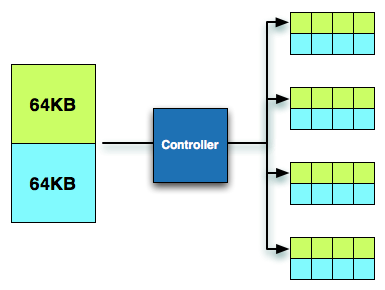
When we go to read the file, it's read across multiple channels and performance is once again, excellent.
Remember what we talked about before however: small file random read/write performance is actually what ends up being slowest on hard drives. It's what often happens on a PC and thus we run into a problem when performing such an IO. Here we go to write a 4KB file. The smallest size we can write is 4KB and thus it's not split up at all, it can only be written to a single channel:
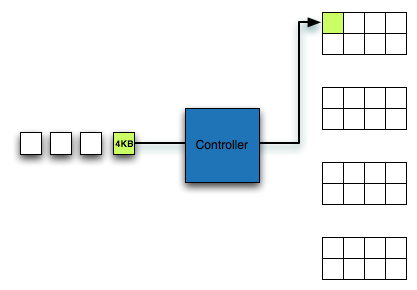
As Alyn discovered, Intel and other manufacturers get around this issue by combining small writes into larger groups. Random writes rarely happen in a separated manner, they come in bursts with many at a time. A write combining controller will take a group of 4KB writes, arrange them in parallel, and then write them together at the same time.
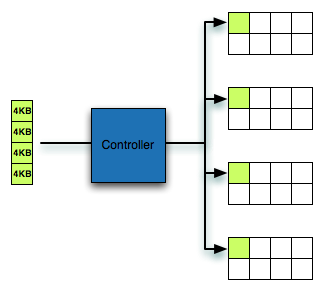
This does wonders for improving random small file write performance, as everything completes as fast as a larger sequential write would. What it hurts is what happens when you overwrite data.
In the first example where we wrote a 128KB file, look what happens if we delete the file:
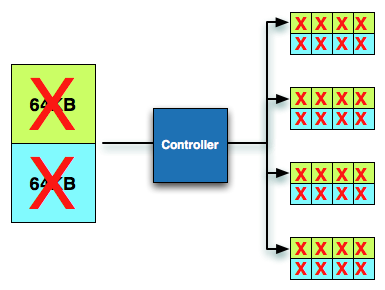
Entire blocks are invalidated. Every single LBA in these blocks will come back invalid and can quickly be cleaned.
Look at what happens in the second example. These 4KB fragments are unrelated, so when one is overwritten, the rest aren't. A few deletes and now we're left with this sort of a situation:
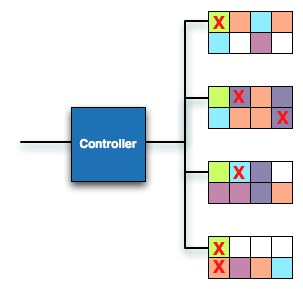
Ugh. These fragmented blocks are a pain to deal with. Try to write to it now and you have to do a read-modify-write. Without TRIM support, nearly every write to these blocks will require a read-modify-write and send write amplification through the roof. This is the downside of write combining.
Intel's controller does its best to recover from these situations. That's why its used random write performance is still very good. Samsung's controller isn't very good at recovering from these situations.
Now you can see why performing a sequential write over the span of the drive fixes a fragmented drive. It turns the overly fragmented case into one that's easy to deal with, hooray. You can also see why SSD degradation happens over time. You don't spend all day writing large sequential files to your disk. Instead you write a combination of random and sequential, large and small files to the disk.










295 Comments
View All Comments
jengeek - Wednesday, September 2, 2009 - link
As of 09-02-09 from Toshiba Direct:80GB = $243
160GB = $473
http://www.toshibadirect.com/td/b2c/adet.to?poid=4...">http://www.toshibadirect.com/td/b2c/adet.to?poid=4...
http://www.toshibadirect.com/td/b2c/adet.to?poid=4...">http://www.toshibadirect.com/td/b2c/adet.to?poid=4...
gfody - Thursday, September 3, 2009 - link
nice thank you, ordered mine from herescrew Newegg! :D
jengeek - Wednesday, September 2, 2009 - link
Both are G2, in stock and ship the next dayBoth are retail box including the installation kit
Best price I've found
ARoyalF - Sunday, September 13, 2009 - link
Thank you posting that!I was going to wait out that awful price hike over at the egg.
You rock
ElderTech - Tuesday, September 1, 2009 - link
It's difficult to imagine the amount of time and effort that went into this article, Anand. Just the clean installs of Win7 took a fair amount of extra effort, let alone the other detailed diagrams and testing involved. From an old technology advocate over many years of working to keep pace with Moore's Law in a variety of research environments, your site provides the most satisfying learning experience of all. A sincere thank you!PS: As for the availability of the G2, it pops in and out of stock at a variety of online retailers, including Newegg, of course, as well as MWave. Both had it available for a short while at $249, Newegg on Friday and MWave today, Monday. However, it's out of stock presently as of midnight, EST 9-1-09 at both, with MWave still at $249 but Newegg going from there to $279 over the weekend and now at an amazing $499! OUCH. Sounds like supply and demand gouging if the price holds when they are next available! There is also some stock available in the distributor channel from small Intel Partners, as I confirmed by calling around the Chicago area. You might give this a try tomorrow. Good luck!
blyndy - Monday, August 31, 2009 - link
You really got performance anxiety because some high-profile people/sites liked your article and linked to it? It's hardly like it got printed in some prestigious science journal and the publishers are waiting on a follow-up.It was just the first time that SDD operation had been detailed in plain english from a reputable website.
Enough of this 'anthology' nonsense, I don't care if it's 1 page or 20, just tell me how some of the new SSDs perform (eg OCZ, Western Digital). You've already detailed how they work so now I want to know which ones do/will support TRIM and some details on the controller. Nothing to get anxious about.
Anand Lal Shimpi - Monday, August 31, 2009 - link
Indeed I did get performance anxiety after the last one, I even got it after the first X25-M. It's not so much the linkage, but the feedback from all of you guys. I received more positive feedback to the last SSD article than any one prior. More than anything I don't want to let you all down and I want to make sure I live up to everyone's expectations.As far as your interests go, all three manufacturers (Indilinx, Intel and Samsung) have confirmed support for TRIM. When? I'd say all three before December.
Take care,
Anand
cacca - Thursday, September 3, 2009 - link
Dear Anand i really thank you for your SSD articles, the improvements in this area seem tangible.Can I ask you to test Fusion-IO & ioXtreme, i am really curious to see how this other approach performs.
I know that isn't a perfect apple to apple comparison but at least we could compare the per $ performance.
Best regards
Ca
vol7ron - Monday, August 31, 2009 - link
Good article.I have a follow-up question regarding your size suggestion.
In more words you say, "get the size you need," but don't these drives perform that much better in a RAIDed system?
The cost per GB isn't that much more if you're looking at getting a 160GB Intel drive, to get the 2x 80GB instead.
SSDs are more reliable than HDs and you have the benefit of more RAM. 2x 32MB for an SSD in RAID0.
Curious to hear your thoughts,
vol7ron
StraightPipe - Tuesday, September 1, 2009 - link
Since RAID cards aren't going to support TRIM commands for a while, I'd stick with a large, single SSD.Anybody ahve any experience running these cards in RAID? I'd love to put some of these in my server, but i'm terrified of lossing data through the complexities of RAID combined with SSD.
I'd love to do a simple RAID1 setup, but it looks like i may be better of waiting too.
In the mean time, these look like a mean machine for an OS disk.